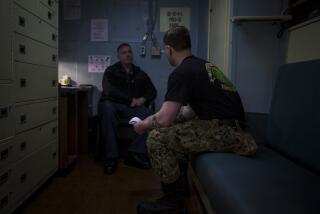Navy Sailor Accused of Killing Gay Shipmate Seeks Civilian Counsel
- Share via
YOKOSUKA, Japan — Airman Apprentice Terry M. Helvey, 21, told a U.S. Navy judge today that he wants to be represented by civilian lawyers against charges that he killed a gay shipmate. His court-martial is set for April 27.
Taken to a courtroom at the main U.S. Navy base in Japan, the 6-foot-4, 240-pound sailor towered over his two Navy lawyers and military police officers stationed at the courtroom door. He appeared calm and answered promptly when questioned by the court-martial judge, Cmdr. David P. Holcombe.
Helvey is charged with murdering Seaman Allen R. Schindler, 22, in a restroom in a public park in Sasebo, Japan, on the southern island of Kyushu last Oct. 27. Both were among the 930 crewmen aboard the Belleau Wood, an amphibious assault ship.
Schindler, of Chicago Heights, Ill., had disclosed his homosexuality last Sept. 24 to Capt. Douglas Bradt, commander of the Belleau Wood, and asked for a discharge. An autopsy showed that his skull was crushed, all but two of his ribs broken, and his genitals lacerated.
“I am seeking civilian counsel. We are working toward that,” Helvey, of Eloise, Mich., told the judge.
He made no plea either to the murder charge or to lesser charges of assaulting two Navy shore patrolmen on the night of the murder, giving a false statement to Navy authorities and obstructing justice. If he is convicted of the murder charge, the maximum penalty is death.
Holcombe denied a defense motion that he remove himself from the case on the grounds that he had presided over a November court-martial of another Belleau Wood sailor, Navy Airman Charles A. Vins, 20, of Sturgis, Mich. Vins was convicted Nov. 23 of failing to report the attack on Schindler, at which he was present, and resisting arrest. Helvey and Vins were taken into custody the day after Schindler’s slaying.
Vins was initially sentenced to one year in prison and given a bad-conduct discharge, but his prison term was later reduced to four months in return for an agreement to testify against Helvey.
Defense attorneys also asked the judge if he held any opinions about homosexuals.
“Yes, I do, but they are not strong opinions,” Holcombe replied.
Rejecting a suggestion by Navy prosecutors that the trial start Feb. 20, Holcombe set a hearing April 1 to hear motions and fixed the date for the court-martial.
Amid President Clinton’s action to remove a ban on gays in the armed forces, the case has attracted attention from gay organizations in the United States as an example of a gross violation of homosexual rights. They charge that the Navy failed to protect Schindler against harassment and threats on the Belleau Wood.
The Navy, however, said that Schindler was told by the ship’s officers that he should report any trouble and insisted that the sailor had made no complaints.
Schindler had been in the Navy for more than four years and aboard the ship for 11 months. At the time of his death, he was being processed for discharge because of his disclosure of homosexuality.
Navy announcements have confirmed indirectly that others also were present at the scene of the killing, but Navy spokesmen have refused to identify the witnesses or specify how many of them there were. Sasebo police turned jurisdiction over to U.S. Navy officials after they determined that no Japanese were involved, either as participants or as witnesses.
Reporters were allowed to attend the arraignment and have been notified that the court-martial will be open to the media, although the number of journalists permitted to attend will be limited to eight, including one Japanese. The use of TV cameras and tape recorders, however, has been forbidden.
More to Read
Sign up for Essential California
The most important California stories and recommendations in your inbox every morning.
You may occasionally receive promotional content from the Los Angeles Times.













